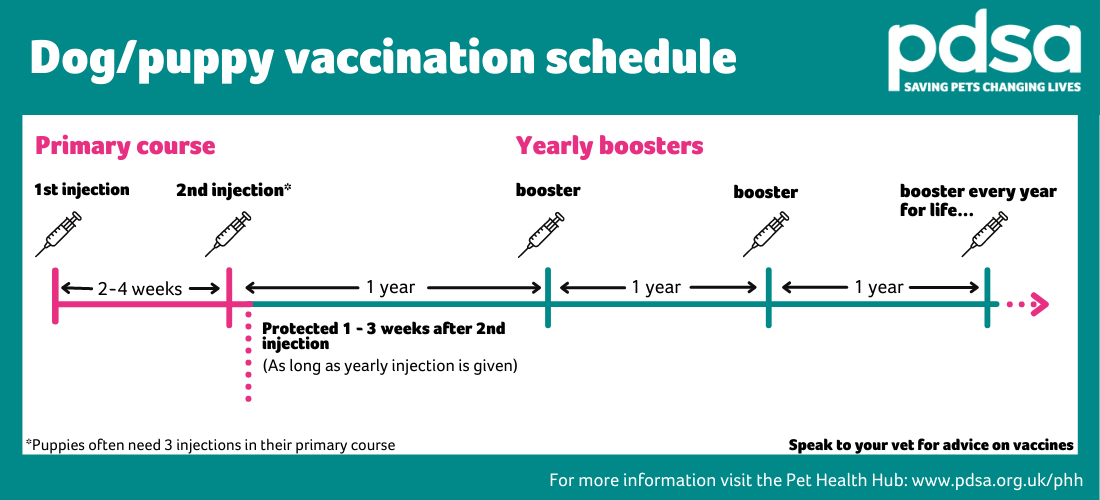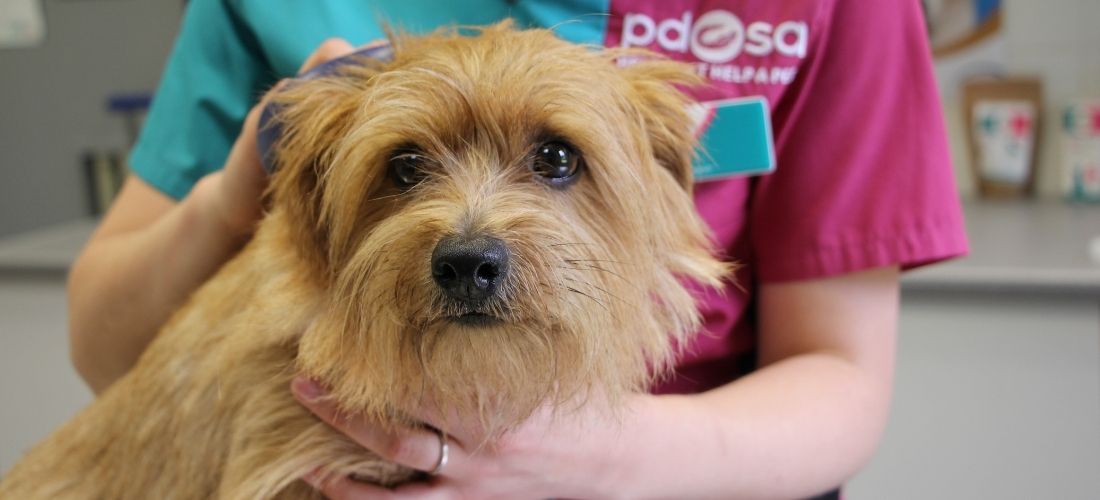Dog Vaccines
Overview
- Vaccinations help protect against serious, potentially fatal diseases.
- All dogs in the UK should be vaccinated against:
- Parvovirus
- Distemper
- Leptospirosis
- Infectious hepatitis
- Depending on your dog’s lifestyle, they may also need a vaccine for kennel cough and/or rabies.
- Your dog should be vaccinated as a puppy, then have regular boosters throughout their life.
- Contact your vet to discuss what vaccinations your dog needs.

All dogs living in the UK should be vaccinated against:
- Parvovirus – a highly contagious, potentially deadly disease that causes severe vomiting and diarrhoea. After an initial primary course, parvo vaccination is usually necessary every three years.
- Distemper – a very serious, often fatal disease that affects several different organs in the body including the guts, heart, immune system, lungs, brain and nerves. After an initial primary course, distemper vaccination is usually necessary every three years.
- Infectious Hepatitis – a virus that attacks the liver, kidneys, eyes and blood vessels. Infectious hepatitis spreads in bodily fluids and can survive in the environment for up to a year. After an initial primary course, infectious hepatitis vaccination is usually necessary every three years.
- Leptospirosis – a bacterial disease that causes serious illness by damaging vital organs such as the liver and kidneys. In humans, leptospirosis is known as ‘Weil’s disease’. After an initial primary course, leptospirosis vaccination is usually necessary every year.
Some dogs need other vaccines, such as:
- Kennel cough – recommended if your dog mixes with a lot of other dogs, or has a health condition that could make kennel cough more serious. It’s usually a requirement if your dog spends time in kennels, doggy day care, has a dog walker, or attends dog events and shows. Kennel cough vaccination should be given each year your dog is at risk.
- Rabies – necessary for dogs that travel in and out of the UK. Rabies vaccination is given every one to three years (depending on the vaccine) – your vet will discuss the best schedule to keep your dog safe if you are travelling abroad.

Puppy vaccines/primary course
- Puppies should ideally start their vaccines at around 6-8 weeks old, and have *2 injections, 2-4 weeks apart.
- They will be fully protected 2-4 weeks after their final injection.
- Protection lasts 1 year – after which they’ll need a booster.
*Some puppies, but not all, need a third injection as part of their primary course.
Adult boosters
- Adult dogs need a leptospirosis booster every year, and a distemper, parvovirus, hepatitis booster every three years, to stop their immunity decreasing over time.
- If you stop vaccinating your dog, they will be at risk of catching infectious diseases.
Vaccines for travel
If you want to travel outside of the UK with your dog, you need to vaccinate them against rabies, and check the specific entry requirements for the country you are visiting. Each country has different rules, so it’s important to be sure about what you need to do long before you travel. It’s also important to find out what your dog needs to get back into the UK. Visit the government website for more information on taking your dog abroad.
Titre testing
Titre testing is a set of blood tests that check the immunity your dog has against the diseases they’ve had vaccines for in the past. Your vet may recommend titre testing if you are concerned about over vaccinating your dog, or if you are trying to reduce vaccinations because of a specific worry (e.g. a previous allergic reaction to a booster). There are times when your dog may need a titre to confirm their protection for a particular disease for other reasons, for example your dog may need a titre test after their rabies vaccine, if they are travelling to certain countries.
Titre testing isn’t a permanent alternative to vaccination boosters, because your dog’s immunity will run out eventually – but if your dog’s titre test results show that they still have some remaining protection against some of the diseases that were due for booster vaccinations, you may decide to leave those particular vaccines out of the schedule that year.
A limitation to titre tests is that they show you the level of protection your dog has at the time of their blood test, but do not guarantee that your dog will have enough protection for a full year afterwards. This means that theoretically your dog’s protection could run out half way through the following year, which would leave them unprotected for 6 months, until their next test and booster.
Titre tests are available for parvovirus, infectious hepatitis and distemper. There is no titre test available for leptospirosis, so your dog will always need their yearly booster for this, even if their results show that they are protected for other diseases.
Discuss your options with your vet if you want to know more about titre testing.
If you have general worries about vaccination safety, always speak to your vet or vet nurse who will be happy to discuss your concerns. You can also check out our myth-busting information on vaccines.

- Before vaccinating your dog, your vet will give them a full check-over and ask you some questions about their general health – it’s important that your dog is healthy when they have their vaccination.
- Your dog’s vaccine will be given as an injection under the skin on the back of their neck (except kennel cough, which is a squirt up the nose).
- Your dog will need to be held still while the vaccine is given. If you don’t feel comfortable doing this, tell your vet so that they can ask someone else in the practice to help.
- Vaccinations aren’t usually painful, but they can feel cold or sometimes sting a little.
- A vaccination appointment is an excellent opportunity to discuss any questions or concerns you have about your dog – for example, if you think your dog might be gaining weight, need a worming tablet, or you’re having trouble with dental care.
Possible side effects
Similar to human vaccines, side effects are rare. Most dogs don’t experience any at all, but if your dog does have any, they are likely to be mild (high temperature, low energy, and a reduced appetite) and pass within 24-48 hours. Serious side effects are extremely rare, but if your dog does experience any, speak to your vet. It’s important to remember that although vaccines can cause side effects, so can nearly every other medicine, and the risk is much lower than staying unvaccinated.
Protecting unvaccinated puppies and dogs
Unvaccinated puppies
If your puppy/dog is unvaccinated, or has only had part of their primary course, keep them safe by following the guidance below:
- Don’t allow them on the ground in public places – it’s fine to take them out, but make sure you carry them.
- Don’t allow them to socialise with any unvaccinated dogs from outside of your household.
- Don’t bring any new/unknown dogs into your home.
- They are safe to go into your garden, as long as no unvaccinated dogs have visited recently, and it’s secure from foxes.
Unvaccinated dogs
If your dog has been previously vaccinated, but has missed a vaccine, they might have protection for 2-3 months after their booster was due, but then they will be at risk again. Follow the guidance below until they are fully protected:
- Keep them away from other dogs and avoid walking in areas where many other dogs have been (perhaps consider walking on a quiet footpath instead of visiting the local park).
- Avoid areas with a high leptospirosis risk, i.e. areas that farm animals and rats live such as farm fields, ponds, stagnant water and rivers.
- How do vaccines work?
- Can my dog be vaccinated if they are poorly?
- How long do dog vaccines last?
- Can my dog have vaccinations if they’re taking regular medication?
- Are vaccines dangerous?
- Are dog vaccinations necessary every year?
How do vaccines work?
When your dog is vaccinated, a small amount of the disease (changed so it can’t cause illness), is injected into them. This teaches their immune system to defend itself against that particular disease, so if they are exposed to it for real they are much less likely to become poorly.
Can a vaccinated dog get parvo?
Although vaccinations provide excellent protection, none can guarantee 100% cover. So yes, theoretically, vaccinated dogs can still catch the diseases that they have been vaccinated against, but this is significantly less likely. In addition to this, if a vaccinated dog catches a disease they have been vaccinated against, they are likely to develop less serious symptoms and have a much higher chance of recovery.
Can my dog be vaccinated if they are poorly?
It’s always safest to give a vaccination when your dog is as fit and healthy as possible. Contact your vet for advice if your dog is showing any signs of illness before their vaccination appointment.
What vaccines are required by law?
There's no legal requirement to give your dog vaccines in the UK. However, vets recommend core vaccines for every dog to keep them safe and healthy. The exception to this is the rabies vaccine, which is a legal requirement if your dog is travelling in and out of the UK.
How long do dog vaccines last?
The length of vaccination protection depends on the disease, the type of vaccine used and your dog’s immune system. As a general rule, leptospirosis vaccines provide protection for about a year, and distemper, parvovirus and hepatitis vaccines last three years. However, this can last a little longer (often 2-3 months more) if you’ve kept your dog’s vaccines up to date throughout their lives. If you’re unsure whether your dog is still protected by their vaccines, speak to your vet to discuss their specific situation.
Can my dog have vaccinations if they’re taking regular medication?
Most medications won’t affect your dog’s vaccinations. However, some drugs such as steroids and certain ‘anti-itch’ drugs can affect vaccines, so it’s always best to discuss this with your vet.
Are vaccines dangerous?
All vaccines used by vets in the UK are licensed, meaning they have to go through rigorous safety checks before they are approved for use. These licenses are also constantly under review by the Veterinary Medicines Directorate to make sure they stay safe for your dog. As with any medication, there’s always the possibility of side effects, but they are rare, and the benefits of vaccination far outweigh the risks.
Are dog vaccinations necessary every year?
Leptospirosis vaccine needs to be given every year, but distemper, hepatitis and parvovirus are often only needed every 3 years.
Published: April 2022
Did you find this page useful?
Tell us more
Please note, our vets and nurses are unable to respond to questions via this form. If you are concerned about your pet’s health, please contact your vet directly.
Thank you for your feedback
Want to hear more about PDSA and get pet care tips from our vet experts?
Sign up to our e-newsletter
Written by vets and vet nurses. This advice is for UK pets only. Illustrations by Samantha Elmhurst.

